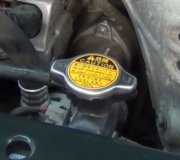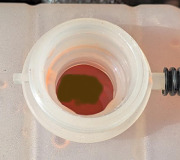Coolant only rarely leaks outside the engine from a leaking head gasket, and then, rather slowly. Most commonly they leak coolant into one of the cylinders, then it shows up as white smoke from the tail pipe.
There are two tests for a leaking cylinder head gasket, but neither is appropriate for the type of leak you described. Once that is solved, your mechanic can perform a chemical test at the radiator cap, or on GM cars with no cap, at the reservoir. It involves drawing air from the radiator, while the engine is running, through a glass cylinder with two chambers partially-filled with a special dark blue liquid. When coolant leaks into a cylinder, combustion gases usually also leak back into the cooling system. Those gases will turn that blue liquid a bright yellow.
Another test that works well when you are losing small amounts of coolant and have to add every few days to a few weeks is to add a small bottle of dark purple dye to the coolant, then you search a day or two later with a black light. The dye will show up as a bright yellow stain that you can follow back to the source. If the head gasket is leaking, you will find that dye inside the tail pipe. Auto parts stores will have the correct dye for the fluid being tested, and those that rent or borrow tools should have a black light.
Friday, December 15th, 2017 AT 5:04 PM



